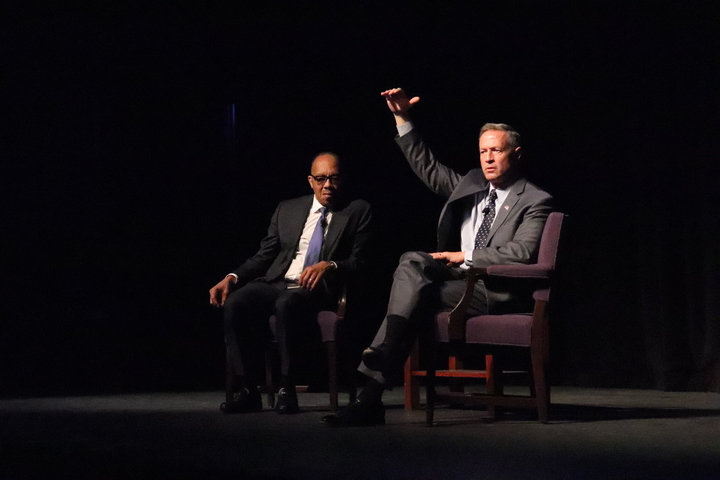
Former Governor Martin O’Malley at Cahn on Monday night.
Photo by Ben Bomier / North by Northwestern
Rarely a day goes by when I don’t think about where we are right now as a country,” said former Maryland governor Martin O’Malley with a wistful tone, “and how it might have been changed.”
On Oct. 16, the former governor, Baltimore mayor, and brief 2016 presidential candidate spoke to an audience of about 50 students in Cahn Auditorium. The event, sponsored by College Democrats as their fall speaker event, was moderated by New York Times columnist and Pulitzer Prize winner for commentary Eugene Robinson.
O’Malley spoke at length about the challenges of mounting a presidential campaign in 2016, noting that even as a primary contender on the Democratic side, the circus of Donald Trump’s candidacy presented an insurmountable obstacle.
“I’ve never had a more frustrating experience in my life than trying to put forward a thoughtful candidacy against the background of 24/7 Donald Trump,” O’Malley said. “So much of the oxygen was taken up by his outrageous and increasingly, more and more overtly - it has to be said - overtly fascist appeals, as the campaign progressed, that it was like trying to have a serious political conversation over a background of political pornography.”
O’Malley also had choice words about the Democratic primary, specifically, the primary debates. During his candidacy, O’Malley, who often polled within the margin of error on major polls, decried the sparse and largely primetime-free Democratic debate schedule, as well as the minimal about of speaking time he was given at debates.
“We really made a big mistake, I believe, in not taking to primetime airwaves with our own debates at the same time that Republican candidates were on every other week,” O’Malley said. “We never had a debate in August, didn’t have a debate in September, it wasn’t until October that we had a debate, there was only one in primetime, and then we never had another debate in primetime again...we need to own that.”
Asked about his views as to why the election played out as it did, O’Malley pointed to a growing sense of despair that he said followed in the wake of the Great Recession.
“There were declining wages over a long period of time,” O’Malley said, “and people feeling like ‘look, my country’s not working for me anymore’...when that becomes the feeling among vast numbers of people, then voting simply becomes an act of protest.”
But O’Malley’s analysis of the 2016 election did not take away from his sense of hope in the future, as he noted when discussing the prospects of young, Democratic candidates running for local office.
“The attitudes of young people and better governance at the local level gives me a lot of hope for the future,” he said. “We just have to get through this temporary period, and remind each other that darkness makes a great canvass - so if you’re thinking about running for office, quite honestly, I think a lot of people across the country are looking for what’s next.”